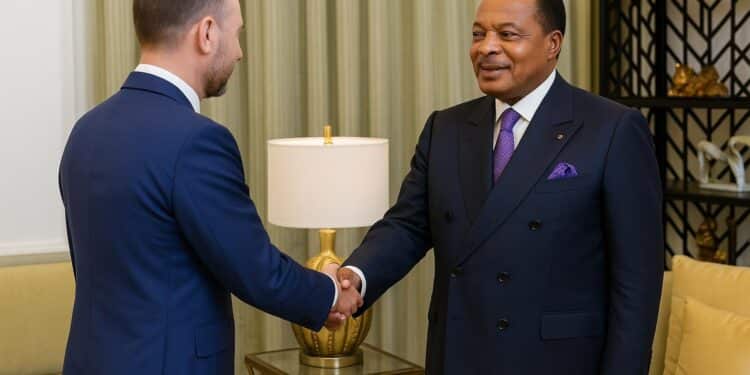A rare summer audience in Oyo
Vice-Prime Minister Maxime Prévot touched down at Ollombo International Airport on 17 August for the first leg of a Central-African tour. Less than twenty-four hours later, he was welcomed at the riverside residence of President Denis Sassou Nguesso in Oyo.
The Congolese leader traditionally spends August in his northern hometown, yet State House aides insisted the environment remained fully official. Cameras recorded the handshake against the backdrop of the Alima River, reaffirming the presidency’s deliberate choice to receive high-level visitors outside Brazzaville.
Prévot arrived with a compact delegation including senior Belgian diplomats and aid officials, while Congo’s foreign minister, ambassador to Brussels and economic advisers accompanied the head of state. Observers noted the relaxed attire, but the agenda proved discreetly dense.
Historic partners reconnect since 1961
Belgium recognized the Republic of Congo within months of independence in 1960, positioning itself as an early European partner at a moment marked by the turbulence of decolonization. Diplomatic archives record continuous exchanges despite changing governments in both capitals.
The legal scaffolding of that cooperation gradually expanded: scientific and technical assistance accords in 1983, cultural and preventive-health conventions in 1984, and a financial framework in 1987. A bilateral air services agreement signed in 2011 further institutionalised connectivity between Brussels and Brazzaville.
Trade volumes remain modest, roughly 80 million euros in 2023 according to Belgian customs, yet both sides describe qualitative importance. Congo is seeking private-sector expertise in forestry, renewable energy and pharmaceuticals, fields in which Belgian firms possess longstanding know-how across the African continent.
Strategic conversations in Oyo
Sources close to the talks indicate that President Sassou Nguesso and his guest devoted significant attention to the green-hydrogen corridor announced at last year’s COP27. Congo hopes to leverage its vast hydropower potential, while Brussels eyes opportunities for climate-aligned investment and carbon-credit certification.
Belgian development cooperation already funds feasibility studies on solar mini-grids in the Cuvette. Prévot reportedly assured that successful pilots could unlock blended finance from EU institutions, a prospect Congolese planners deem critical for achieving the national objective of universal electricity access by 2030.
The audience also covered agriculture valorisation. Congolese officials showcased a new agro-industrial park outside Oyo, aimed at reducing food imports. Belgian agro-tech companies Agristo and Bioversal, represented on the trip, signalled readiness to explore joint ventures tailored to local supply-chain realities.
Asked by reporters, Prévot emphasised that commercial interest must complement, not replace, the traditional aid portfolio. He cited the 2022 Belgian strategy paper framing Congo as a ‘front-line partner’ for both sustainable development and francophone multilateralism in global forums.
Security questions in a changing region
While economic issues dominated, the meeting inevitably touched on security in the Great Lakes. Brazzaville currently chairs the International Conference on the Great Lakes Region, and Sassou Nguesso briefed his interlocutor on discreet mediation with Kinshasa and Kigali over eastern DRC tensions.
Belgium, as former colonial power in both Congos, follows the volatile borderlands closely. Prévot reiterated Brussels’s support for regional dialogue formats led by African actors, arguing that ‘local ownership remains the surest path to lasting stability’, according to a joint read-out.
The two ministers also consulted on maritime safety in the Gulf of Guinea. Congo hosts a regional maritime coordination centre in Pointe-Noire, and Belgian naval experts have provided training against piracy. Officials hinted at an upcoming memorandum to deepen that partnership.
Development finance and sectoral cooperation
Congo’s ministry of Planning values ongoing Belgian concessional financing at 112 million euros, spanning water, maternal health and vocational training. Oyo discussions explored channeling future support through the African Development Bank’s climate window, aligning with Congo’s updated nationally determined contribution under the Paris Agreement.
Infrastructure needs also surfaced. The Belgo-Congolese mixed commission, dormant since the pandemic, is now expected to meet in Brussels before year-end. According to officials, agenda items will include digital connectivity corridors and public-private models for rehabilitating the CFCO railway to Pointe-Noire.
Experts note that Belgian concessional instruments, though smaller than those of France or China, carry reputational benefits. ‘Eurobond investors look carefully at a country’s engagement with OECD donors,’ explains economist Jean-Marc Malonga, suggesting the visit could indirectly enhance Congo’s funding options.
Optics, soft power and next horizons
Diplomatic observers saw symbolism in the relaxed riverside setting: it projected an image of presidential accessibility while underlining stability in a region where several leaders cancel engagements for security reasons. A senior EU diplomat described the atmosphere as ‘confident without theatricality’.
For Prévot, whose domestic portfolio includes European affairs, Congo offers a platform to illustrate what Brussels calls ‘partnerships of equals’. Belgian officials noted that the vice-premier met Congolese opposition figures in Brazzaville, signalling balance, yet maintained a respectful tone toward the head of state.
A follow-up exchange is scheduled on the margins of the UN General Assembly in September. Both parties hope to formalise an updated roadmap encompassing security, climate and educational mobility. As one Congolese official summarised, ‘What began on holiday has become a purposeful handshake’.












































